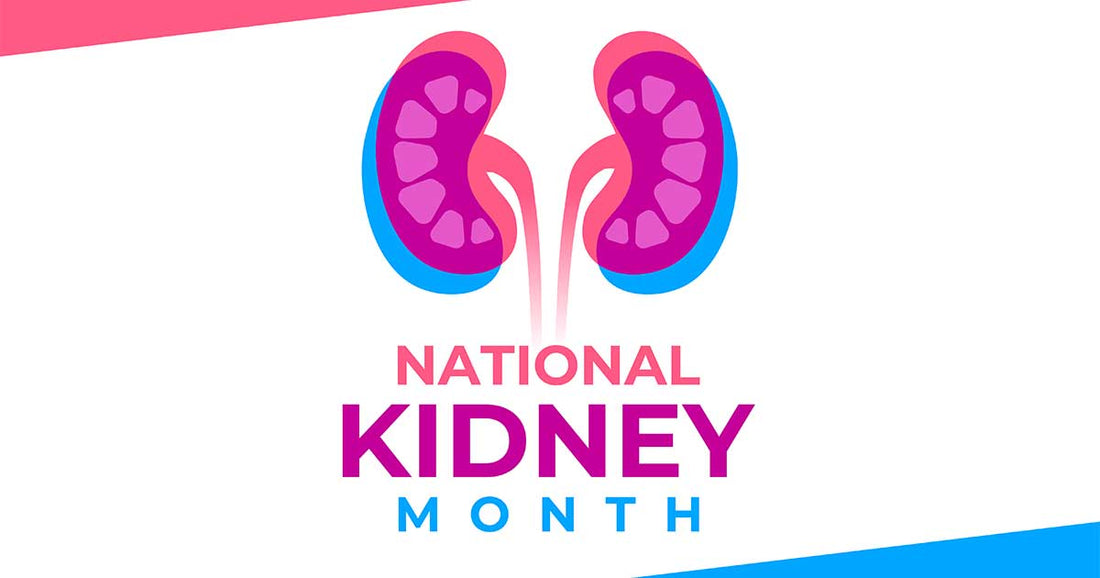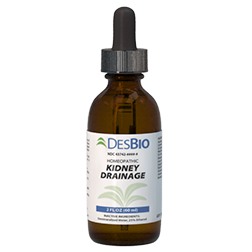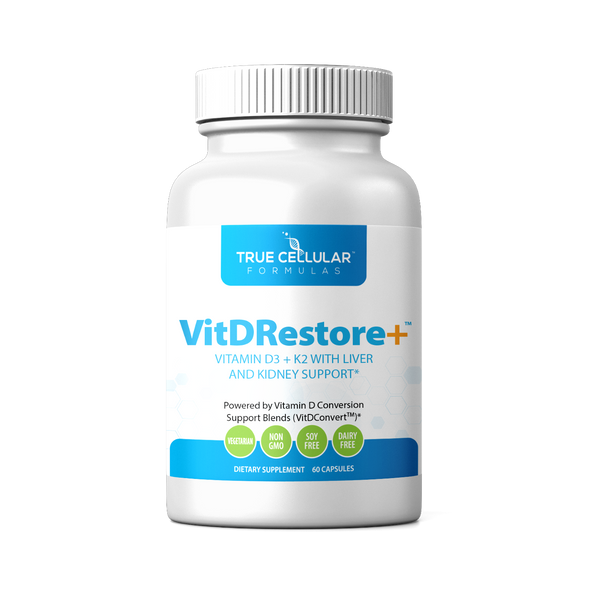National Kidney Month: The Surprising Causes of Poor Kidney Health

Share
Did you know up to 10% of the worldwide population is affected by poor kidney health? March is National Kidney Month. This article discusses some of the most surprising causes of poor kidney health and the top foods and all-natural supplements for the kidneys.
Here are a few surprising causes of poor kidney health:
Poor gut health.
The gut is home to trillions of microbes, which is known as the gut microbiota. This complex system of microorganisms includes fungi, bacteria, viruses, and other organisms. They all work together within the digestive system to support the immune system's digestion and provide energy to the body.
Preliminarystudies indicate a pregnant mother’s gut health can influence her unborn child’s health during pregnancy. Several risk factors related to poor gut health in children have been linked to alterations in the gut microbiota, including maternal obesity, premature birth, low birth rate, and maternal malnutrition.[1]
These changes in the gut could accelerate the negative impact of poor kidney health. In another study, researchers note the increased urea concentration often seen in those suffering from kidney disease can increase the production of toxins in the gut, negatively impacting the intestines and gut health.[2]
Vitamin Deficiency.
Poor kidney health could play a key role in the body’s absorption of nutrients. Here are a few examples of how poor kidney health may impact vitamins in the body:[3]
- Vitamin D. Dialysis patients tend to be vitamin D deficient, and evidence supports the usefulness of vitamin D supplements.
- Vitamin B6. Subjects with poor kidney health may be at risk for lower vitamin B6 levels. The amount of B6 consumed in food decreased as their glomerular filtration rate (GFR), a chief measure of kidney function, decreased. Vitamin B6 is essential for keeping the immune system and nervous system healthy.
- Vitamin C. Vitamin C loss during a single dialysis session could range from 28% to 60%. Preliminary studies indicate vitamin C supplementation may assist in improving health. Studies are ongoing.
Here are some of the best and worst foods for kidney health:
|
Poor Kidney Health: Top Foods to Consume |
Poor Kidney health: Foods to Avoid |
|
Blueberries |
High sodium foods |
|
Onions |
Insufficient water consumption |
|
Fish |
Excessive alcohol or caffeine consumption |
|
Apples |
High protein diet |
|
Cabbage |
Processed meats |
|
Strawberries |
Packaged and processed foods |
|
Cauliflower |
Dark colored soda |
|
Olie oil |
Canned foods |
Note: Individuals with poor kidney health are often advised to decrease consumption of sodium and various foods often considered healthy including those rich in potassium, protein, and phosphorus. When the kidneys aren’t working at optimum levels, these nutrients might linger in the body, altering the delicate balance needed for optimum health. This imbalance can put additional strain on the kidneys.
Consult your physician immediately if you are suffering from poor kidney health.
Cardiovascular disease.
Cardiovascular disease (CVD) is seen as both a cause and effect of poor kidney health. Controlling CVD helps to slow the effects of poor kidney health as well as reduce the risk (and severity) of cardiovascular disease itself. While CVD and poor kidney health are independent health issues, the risk of mortality is increased when both health conditions exist together.[4]
Urinary tract obstruction.
A ureteral obstruction can prevent urine from moving into the bladder and out of the body. If the blockage isn’t removed, it can back up and damage the kidneys. If left untreated, this blockage can cause pain and increase the risk of infection, sepsis, kidney failure, or death.
The most common causes of urinary tract obstruction include the following:
- Narrow urethra (abnormality found in children)
- Kidney stones
- Enlarged prostate
- Scar tissue
- Abnormal cell growth
Here are the top symptoms of a urinary tract obstruction:
- Decreased urine flow
- Increased nighttime urination
- Nausea and throwing up
- Severe pain on one side of the belly or below the ribs
Contact your doctor immediately if you suspect a urinary tract blockage.
Insulin resistance.
The kidneys play a surprising role in maintaining stable and balanced glucose levels. Key functions include the release of glucose, glucose uptake to satisfy energy needs and the reabsorption of glucose in the body.[5]
Insulin resistance is ranked among the leading causes of poor kidney health in the Western world.[6] In addition to doctor-prescribed medications, care for those with insulin resistance and insulin resistance include the following:
- Weight loss for obese patients
- Salt restriction
- Protein-reduced diet
- Smoking cessation
- Moderate exercise (150 minutes weekly)
Top Supplements For Kidney Health
In addition to healthy eating and maintaining an active lifestyle, all-natural supplements are available for kidney health:
Kidney Drainage 
“Kidney drainage” refers to the process where urine flows out of the kidneys. In some instances, the kidneys may not drain properly, which could lead to a backup of urine in the kidneys.Kidney Drainage is a product designed to help ease symptoms of drained kidneys, such as fatigue. There are several potential reasons for this health issue, which would need immediate medical attention.
VITDRestore+™ - Vitamin D3 + K2 with Liver and Kidney Support 
When the skin is exposed to natural sunlight, the kidneys convert it to vitamin D, making it useful to the body. (The kidneys also convert supplements into useful vitamin D as well).
Key functions of vitamin D include helping to regulate muscle function and the body’s ability to absorb calcium. Vitamin K2 is a fat-soluble vitamin that helps strengthen bones teeth, and regulate calcium. A vitamin K2 deficiency has been linked to compromised kidney functions.[7]
VITDRestore+™ combines vitamin D and K2, helping to support the health of the liver and kidneys. In addition, it assists the body’s natural ability to utilize calcium in the body, particularly in the bones and teeth.VITDRestore+™ contains no artificial ingredients and is GMO-free.
Ks - Kidney S 
Ks - Kidney S has several important functions:
- Helps to stabilize kidney functions
- Reduce the low back pain linked to kidney issues
- Relieve the body of excess water without impacting proper electrolyte levels
- Support drainage support during cleansing programs.
Ks - Kidney S can be taken for 1-3 months or as needed.
Summary
The kidneys are vital to overall health. It’s important to understand how the kidneys can affect other parts of the body and how various health issues can also impact the kidneys. Practicing good health habits is essential to kidney health. Consult your physician if you suspect any health issues with your kidneys.
References:
- Chien-Ning Hsu, You-Lin Tain. Chronic Kidney Disease and Gut Microbiota: What Is Their Connection in Early Life? Int J Mol Sci. 2022 Apr; 23(7): 3954. Published online 2022 Apr 2. doi: 10.3390/ijms23073954. [PMID: 35409313].https://www.ncbi.nlm.nih.gov/pmc/articles/PMC9000069/
- Gerren P Hobby, Oleg Karaduta, Giuseppina F Dusio, (et al). Chronic kidney disease and the gut microbiome. Am J Physiol Renal Physiol. 2019 Jun 1;316(6):F1211-F1217. doi: 10.1152/ajprenal.00298.2018. Epub 2019 Mar 13. [PMID: 30864840]. https://pubmed.ncbi.nlm.nih.gov/30864840/
- Aleksandra Beata Juszczak, Maciej Kupczak, and Tomasz Konecki. Does Vitamin Supplementation Play a Role in Chronic Kidney Disease?. Nutrients. 2023 Jul; 15(13): 2847. Published online 2023 Jun 23. doi: 10.3390/nu15132847.https://www.ncbi.nlm.nih.gov/pmc/articles/PMC10343669/
- Dan Pugh, Peter. Gallacher, Neeraj Dhaun. Management of Hypertension in Chronic Kidney Disease. Drugs. 2019; 79(4): 365–379. Published online 2019 Feb 13. doi: 10.1007/s40265-019-1064-1. [PMID: 30758803].https://www.ncbi.nlm.nih.gov/pmc/articles/PMC6422950/
- Curtis L Triplett. Understanding the kidneys' role in blood glucose regulation. Am J Manag Care. 2012 Jan;18(1 Suppl):S11-6. [PMID: 22559853]. https://pubmed.ncbi.nlm.nih.gov/22559853/
- Espen Nordheim, Trond Geir Jenssen. Chronic kidney disease in patients with diabetes mellitus. Endocr Connect. 2021 May 1; 10(5): R151–R159. Published online 2021 Apr 7. doi: 10.1530/EC-21-0097. [PMID: 33830068]. https://www.ncbi.nlm.nih.gov/pmc/articles/PMC8111312/
- Mario Cozzolino,1,* Michela Mangano,1 Andrea Galassi, (et al). Vitamin K in Chronic Kidney Disease. Nutrients. 2019 Jan; 11(1): 168. Published online 2019 Jan 14. doi: 10.3390/nu11010168 https://www.ncbi.nlm.nih.gov/pmc/articles/PMC6356438/
